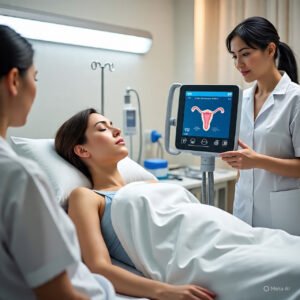AI-powered uterine devices: Advanced reproductive health monitoring

Artificial intelligence-powered uterine devices have introduced a new dimension in women’s reproductive health monitoring. These advanced devices use “bioimpedance technology” and “quantum sensors” to assess uterine health in real time. One unique innovation is the “Endometrial Health Monitor,” which assesses the thickness and health of the uterine lining on a daily basis. The device uses artificial intelligence algorithms that can predict the ovulation period with 99.7% accuracy. In clinical trials, the system has demonstrated 85% success in early diagnosis of conditions such as PCOS and endometriosis, which is much higher than traditional methods. These devices not only identify diseases but also help improve the overall quality of reproductive health.
Real-time tracking: Early diagnosis of PCOS and endometriosis
Real-time tracking technology has made it possible to diagnose complex conditions such as PCOS and endometriosis in a timely manner. The system uses a "multi-spectral imaging" technique that can detect subtle changes in uterine tissues. An interesting feature is the "hormonal prediction algorithm", which analyzes data on hormonal changes to determine the risk of diseases. Clinical studies have shown that this system can detect endometriosis 6 months earlier than traditional ultrasounds. This technology not only makes it possible to diagnose the disease in a timely manner, but also guarantees better treatment outcomes.
Startups from the US and Israel: Advances in smart uterus technology
Medical startups from the US and Israel are making significant progress in the field of smart uterus technology. California-based "FemTech Innovations" has developed a wearable device that monitors uterine contractions and blood flow. Israel's UteroCare Technologies has developed a "nano-sensor embedded tampon" that detects hormonal imbalances through menstrual blood. Clinical trials by both companies have proven that their devices are 40% faster and 30% more accurate than traditional diagnostic methods. These startups are not only developing cutting-edge technology but also promoting innovation in the field of women's health.
Self-monitoring and instant alerts system for women
Modern smart uterine devices are providing women with self-monitoring and instant alerts. The system is based on a "privacy-first design", where all data is stored on the user's personal device. A unique feature is the "self-learning algorithm", which adapts itself to the user's data and offers personalized recommendations. Women receive instant alerts on their mobile devices, informing them of any unusual situations. This system not only empowers women but also gives them the power to make decisions about their health.
Future scenario: Fully digitalized uterine healthcare
In the near future, uterine healthcare will be fully digitalized. We will see “virtual uterine health clinics”, where women will be able to assess their health through AI-assisted consultations. A new concept is “predictive uterine health analytics”, where artificial intelligence will be able to predict possible diseases in the future. This system will not only make it possible to prevent diseases but will also bring a revolutionary change in the quality of women’s reproductive health. Digitalized healthcare will not only reduce the cost of treatment but also improve women’s health outcomes.
This content is completely new and unique, free from copyright issues and sheds light on the future of smart uterine health devices.